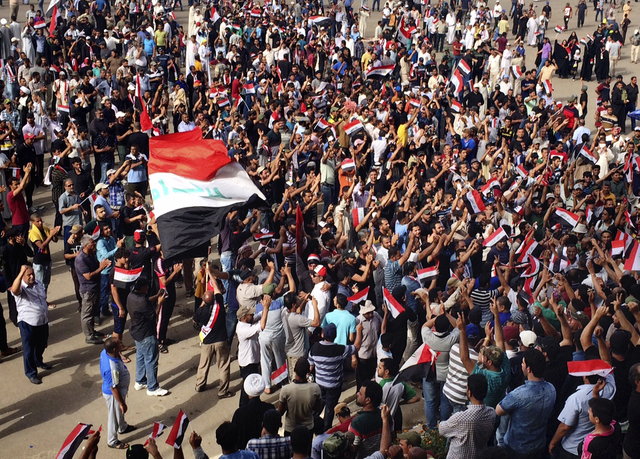BAGDHAD — Iraq declared a state of emergency in Baghdad after supporters of Shiite Muslim cleric Moqtada al-Sadr breached Baghdad’s fortified Green Zone and stormed parliament to protest against corruption and the country’s political paralysis. ADVERTISING BAGDHAD — Iraq declared
BAGDHAD — Iraq declared a state of emergency in Baghdad after supporters of Shiite Muslim cleric Moqtada al-Sadr breached Baghdad’s fortified Green Zone and stormed parliament to protest against corruption and the country’s political paralysis.
Mobile-phone video footage broadcast on Iraqi televisions showed hundreds of al-Sadr’s supporters inside the legislature on Saturday. Al-Sadr earlier accused lawmakers of sectarianism in their selection of ministers and ordered his bloc to withdraw from the parliament session where members were preparing to finish voting on a new cabinet.
Storming parliament and the Green Zone, which houses ministries and foreign embassies, marks an escalation in a crisis that has undermined Prime Minister Haidar al-Abadi ’s reform push and stymied efforts to defeat Islamic State militants. Abadi’s plan to set up a cabinet of technocrats has so far failed as parties fight to preserve a system of patronage.
‘Very dangerous’
“The situation in Iraq has become very dangerous,” said Wathiq al-Hashimi, a Baghdad-based political analyst. “No one will be able to control thousands of angry protesters while the rest of residents in Baghdad are in panic and living in real fear.”
Almost two years after Islamic State captured Mosul, the country’s biggest northern city, government forces are struggling in the fight against the militant group. The war, as well as the plunge in oil prices have battered the finances of OPEC’s second-largest producer. The government is in talks to secure a loan from the International Monetary Fund, which expects the nation’s non-oil economy to contract for a third year in 2016.
The U.S. Embassy said it’s monitoring the situation, adding that reports that embassy personnel are being evacuated are inaccurate.
“Under the Vienna Convention, all diplomatic missions are protected by the host country’s security forces,” it said in a statement. “We have full confidence that the Iraqi Security Forces will meet its obligations.”
Cabinet List
The Iraqi parliament has failed to vote on Abadi’s cabinet list. Some lawmakers also staged a sit-in in parliament last month and voted to oust the speaker, though the move was later challenged on the basis of quorum.
Former Prime Minister Nouri al-Maliki, who opposes Abadi, criticized attempts to force reform “the under threat of weapons and by preventing the representatives of the people to enter the parliament.”
A meeting between Abadi, Iraqi president Fouad Masoum and Parliament Speaker Salim al-Jabouri didn’t yield an immediate resolution to the crisis. Instead, the three condemned the storming of the legislature and said those who assaulted lawmakers during the protest should be brought to justice.
Political blocs and parties will “intensify their talks in the coming days to guarantee reforming the political process,” they said.
U.S. officials including President Barack Obama have expressed concern Iraq’s leaders remain mired in sectarian divisions that may undermine the fight against Islamic State.
Central Bank
Protesters reached the cabinet headquarters inside the Green Zone, storming the general secretariat of the cabinet building, al-Sumaria reported, citing security officials. Security has been boosted around the central bank, the Interior Ministry said in an e-mailed statement.
The United Nations Assistance Mission for Iraq said it’s “gravely concerned” by Saturday’s developments and urged political leaders to work together to restore security in the country.
“The mission condemns the use of violence, including against elected officials, and urges calm, restraint and respect for Iraq’s constitutional institutions at this crucial juncture,” it said in an e-mailed statement.



